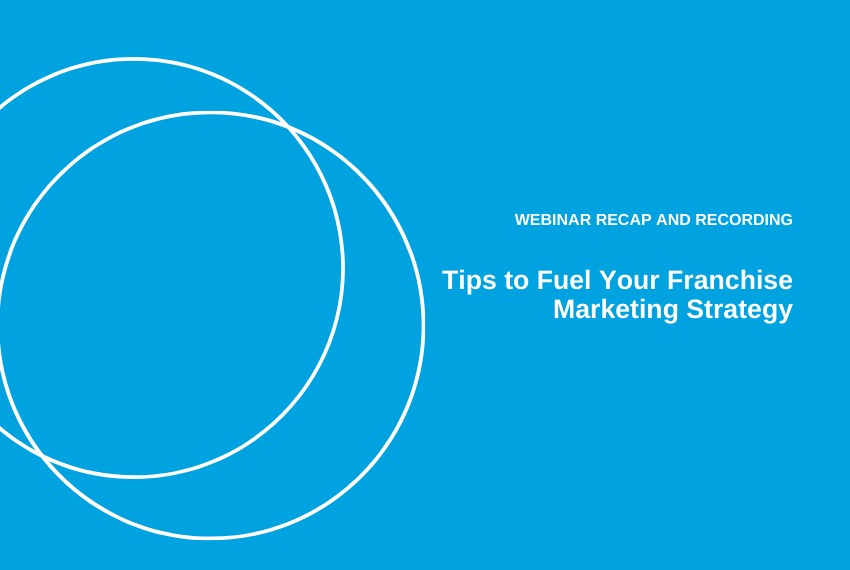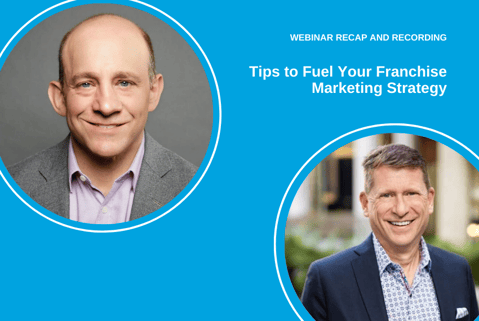Call Sales: +1 (833) 437-3835
Call Sales: +1 (833) 437-3835
Sydney Kida | July 21, 2021 |

The post-pandemic return to restaurants and retailers is in full swing. With this flood of consumers heading to businesses in person again, there is no shortage of demands vying for operators’ attention. Whether you are juggling staffing shortages, an influx of in-store traffic, sustained demand for digital orders, or some combination of all of those factors, chances are marketing efforts have fallen on your priority list.
In a perfect world you’d be able to do it all with time left over to kick back and enjoy a drink of your own. But if you’re among the many looking for franchise marketing tips, including where to focus your time and energy, consider the input from Dan Gertsacov, growth executive and brand advisor, from a recent Q&A-style webinar with Chris Lybeer, chief strategy officer at Revel Systems. Watch the full recording here, or read on for the webinar highlights.

Chris Lybeer: I'm excited about this topic because it's a topic about growing your business and moving forward. I think we're probably all weary about talking about pandemic topics, so I think this is more about the future and less about the past, which is great.
For those of you who don't know Revel, our company is a point of sale (POS) provider, and we are a 100% cloud-based platform. We're very excited that we offer the digital capabilities that everybody needs these days and are excited, as always, to partner with our customers to do that. One of the main areas that we want to do that in is in the area of marketing.
Today we’ve got an expert with us, Dan Gertsacov, and I'm going to have him give you an introduction on his background so you'll know where his perspective is coming from.
Dan Gertsacov: Great, thank you, Chris. I've been on the franchise owner side at Focus Brands, owner of seven brands and 6,000 restaurants, like Cinnabon, Auntie Anne's and Jamba. That is where I met Chris and Revel—we were a Revel customer.
I was also a franchisee. I worked at McDonald's largest franchisee in the world—it has 2,400 restaurants in 20 countries.
I also have two additional perspectives. Prior to getting the restaurants, I was at Google for many years, so I know the perspective from the media platform tech side. I was also an investor operator of a one-operation bar/burger restaurant.
In that role, I had to figure out how to market for our one bar/burger restaurant, so I've had various perspectives to bring to bear, from small to big and from the US to global. I hope to share some of that with you today. It's a real pleasure to be here.
Chris Lybeer: Perfect launching off point. Let's just start with the foundation. Where are we today? If I'm a typical franchisee, and I’ve got five to 50 sites, what are most people doing out there?
And then we can talk about what franchisees should be doing. We’ll explore what the opportunities are, but to start, give us sort of a “state of the business'' in terms of marketing at the franchise level.
Dan Gertsacov: More change has happened in the last six to really the last 12 to 15 months. Then it happened in the prior five years, and that was happening without COVID, and accelerated with COVID.
What I can tell you is, the customers are not going backwards in their need and requirement for convenience; for value for money. Time is always going to be of the essence, the most scarce resource, so the idea that we're going to go backwards—it’s not going to happen, even as you open up your dining rooms.
Online ordering, delivery, pickup, digital payments—all these things are also here to stay. Like it was before, there are two things you need to measure when it comes to marketing ROI and data: Did it drive traffic? Did it drive average check size? Those are the two things I'll keep coming back to. Those are the two key components that have not changed and will not change going forward.
Chris Lybeer: Yeah, great great advice. There are so many options sometimes, and I think you can get lost in the weeds. You do have to keep coming back, and you’ve got to measure stuff to know whether you're getting somewhere. Tech makes it pretty easy to do that these days, so let's talk about—if you're a franchisee—what's the base foundation that you need to have on the marketing side?
Dan Gertsacov: I'm going to go right to the punch line: If your core operations aren't working, there's nothing you can do with marketing to change somebody's experience. That means the bathroom is clean. That means the food comes out hot, the food comes out on time, the pricing is right. That means customer service and smiles… all of those things which have not changed.
Focus on what is the core part of customer experience. Now, look at that as the base of the pyramid onto which you need to start building.
The first thing out of the gate is that you need your customers to be able to find you. And that includes more than Google. There are other services out there.
Make sure you keep your hours of operation up to date, keep your location accurate. People are going online to find out where they can find your physical restaurant. You want to be physically available.
Now you need to start building on the physical availability for mental availability. What does that mean? Being relevant. That means the content you put out there on your website, on your app, and on your social media is relevant to the customer.
There are four basic things to include in your customer-facing content:
If you can answer those four things you don't need a consultant. Answer those four questions. Then you can decide what you need to do to get them to come in one more time or to spend a little bit more. That's where your drive should be. You need to be consistent with your brand; you're not just looking for a transaction, you're building a relationship.
Drive your marketing to build that pyramid, starting with the customer experience, physical availability, mental availability. And then, what are the offers I need to get people to spend a little bit more come one more time?
Chris Lybeer: Good, I love the four things. Where people often start to run into more challenges is: okay, I know what I'd like to do. But how do I do it? I think, especially for franchisees, they're often caught in the really big organization so we've got to be lean on resources and costs and everything. But for those who need to do some marketing, what's your advice on it? Do you hire an agency to do this? Do you hire a kid part time to do this? Do you try to do some of it—you know, carve some hours out on your own?
Dan Gertsacov: As an operator-owner of a franchise or if you have your own restaurant chain, you need to be able to stand the basics of what we're describing. If you're like, “I'm not a digital person,” you've got the wrong mindset. The world is digital. If you want to operate in that world and you want to grow your business, you are now a digital business leader.
You need to know whether the person, whether it's an agency or your marketing person, is being honest with you. You need to be a multi-faceted marketer who's operating in a digital world. It does help to work with an agency, if they have attracted and work with other clients. But if you don’t understand the digital world as it relates to your brand, your customer and your goals, the marketer at the agency won’t understand what you need, either. No agency is going to solve your problem for you. If you don't ask the right questions they're going to give you little. That's the nature of their business.
Ultimately, the owner, leader of the organization needs to understand the basics. They need to know if the rest of the team or agencies have a growth mindset, are analytical, and have an innate curiosity. The only outsourcing that works is when you've got somebody on the inside who can demand, expect and drive the best out of the agency. So it's not an either or, but it's an and.
Chris Lybeer: I’m a believer that marketing efforts should start with data and customer insights. The question then becomes, “How do I get the data?” What are your thoughts here?
Dan Gertsacov: I’ve heard people say, “We won't get to it” when asked about capturing customer data.
The privilege to communicate first-party with your consumers, that is what's going to be the Holy Grail for restaurant marketers. For example, you never hear American Airlines say, “Do you want to fly to London? Go to Expedia to book!” Yet restaurants have lined up to say, “Order digitally by downloading somebody else's app and placing your order from there.”
I would start in your off time. Start building your first-party interactions. Make it clear why your customers should share their data with you, and if they share their data, how will you use it? Will you email them three days a week? How do you share relevant, timely material—content that they want to receive?
I would say twice a month is about the right frequency to reach your customers with relevant content that matters. And it doesn't have to be offers; it doesn't have to be just about you. Your messages should be about them. Put yourself in the shoes of your consumers and you'll learn a lot.
Chris Lybeer: Of course, this is part of Revel’s story. We are a platform that can help you with online ordering, with marketing, etc., and with our technology you can own your customer experience and data from end to end.
Every business should own their customer experience. Third parties can be part of your ecosystem, but as much as you possibly can, you should be driving customers to your website and you should have first-party interactions with them. At Revel, we're big on supporting that with our tech platform.
Have a great day and let's all get this industry roaring again! I feel like we're all in this together and it's such an important industry for our economy. We're going to make it happen.